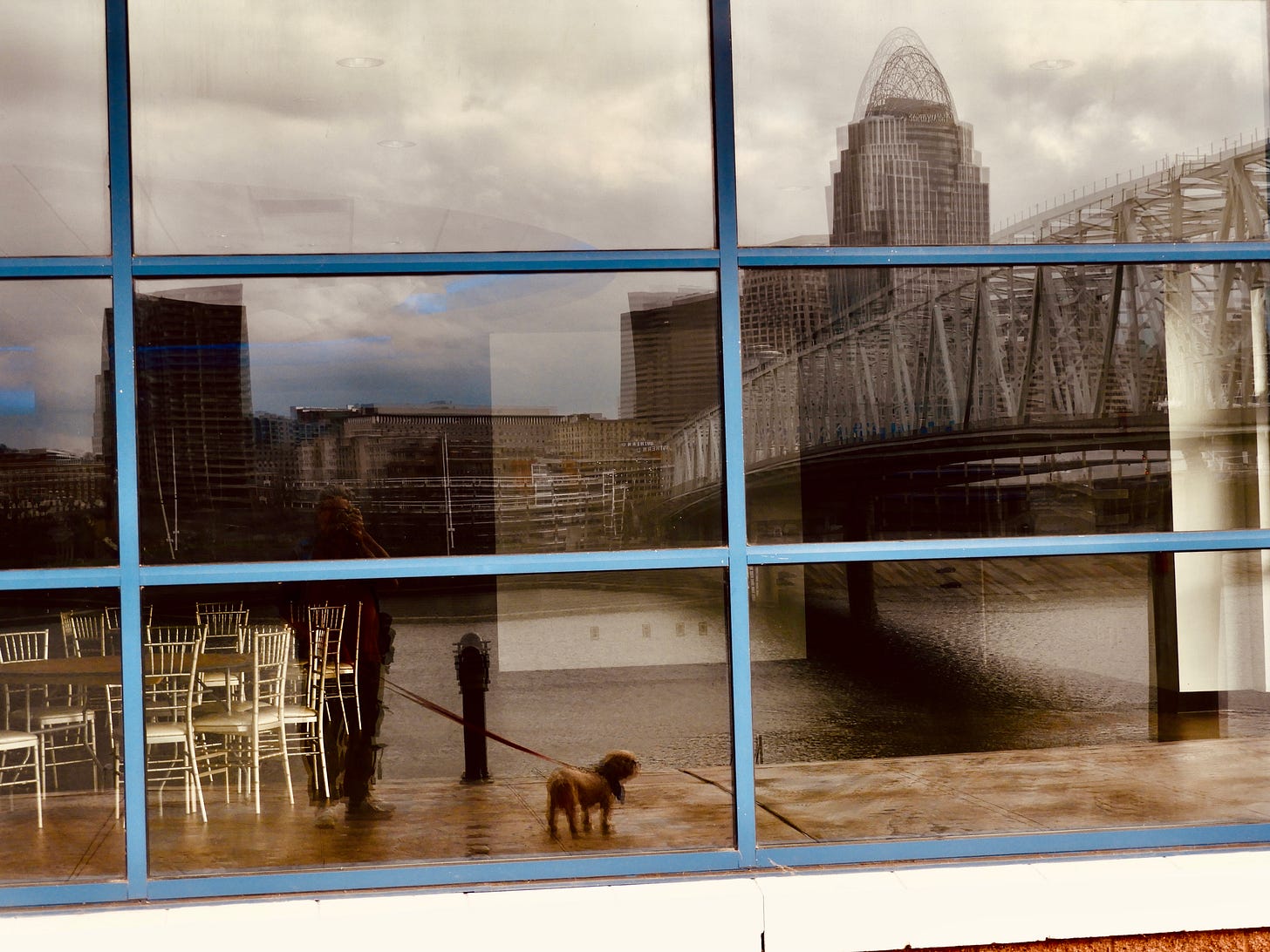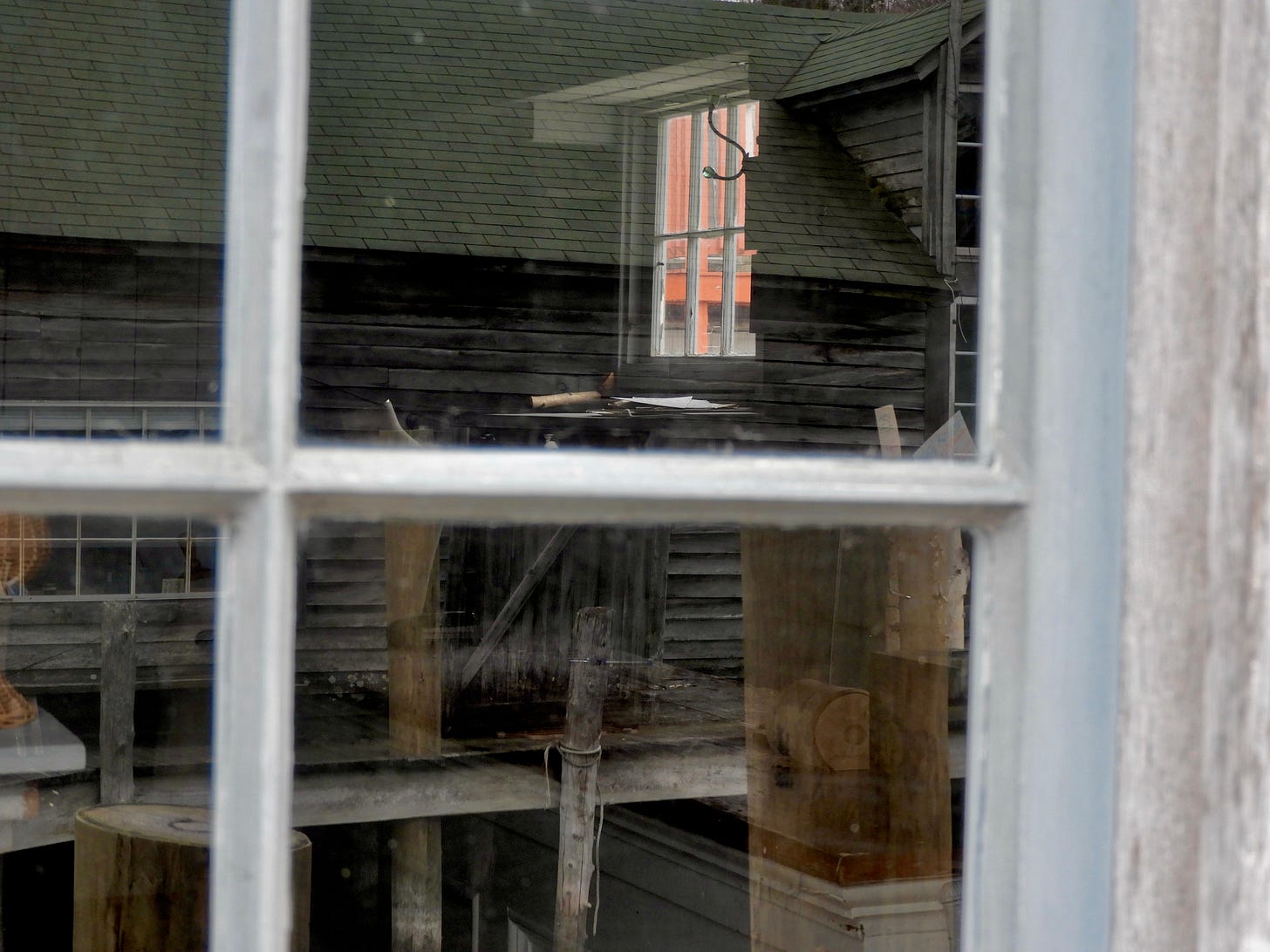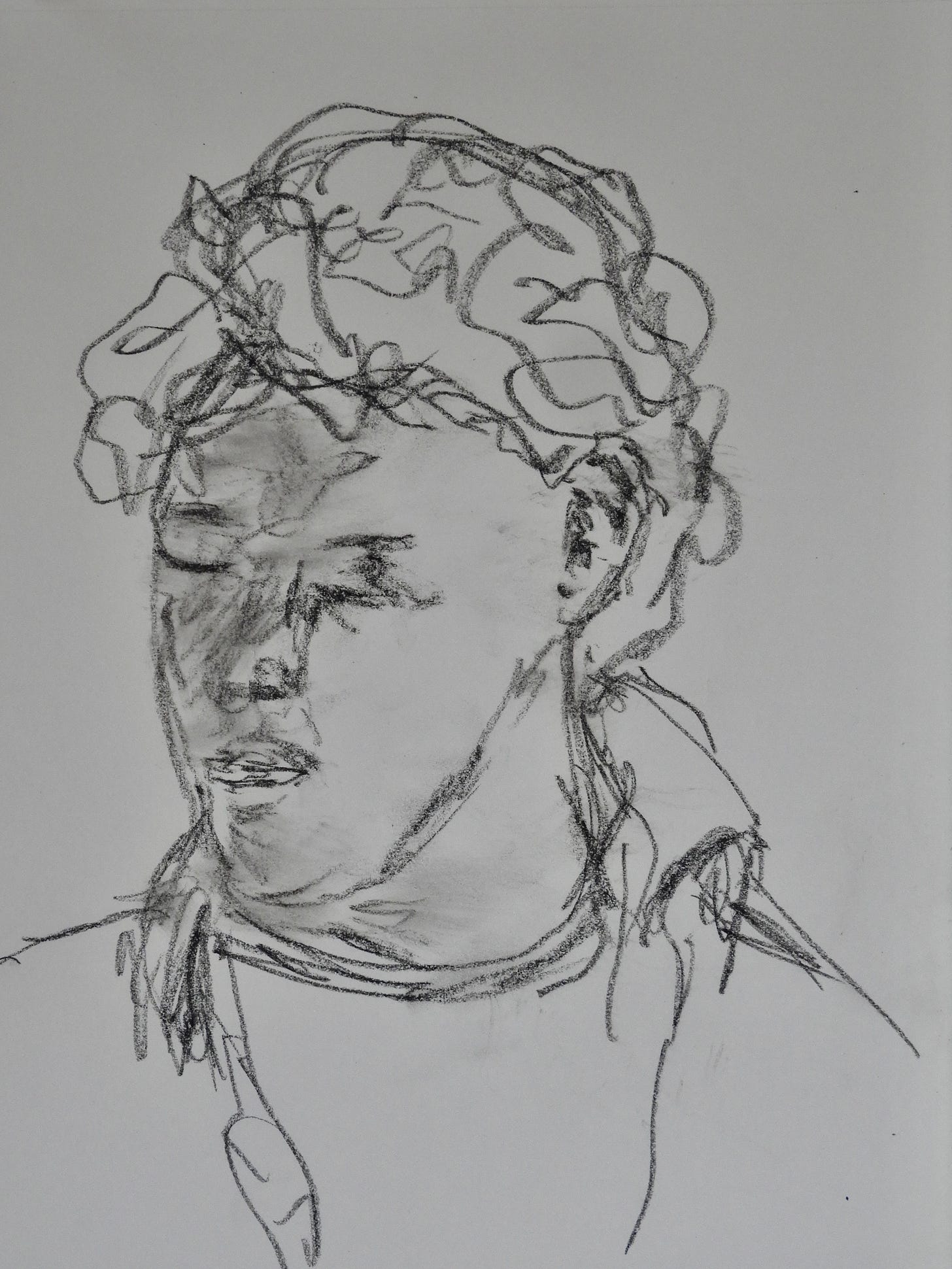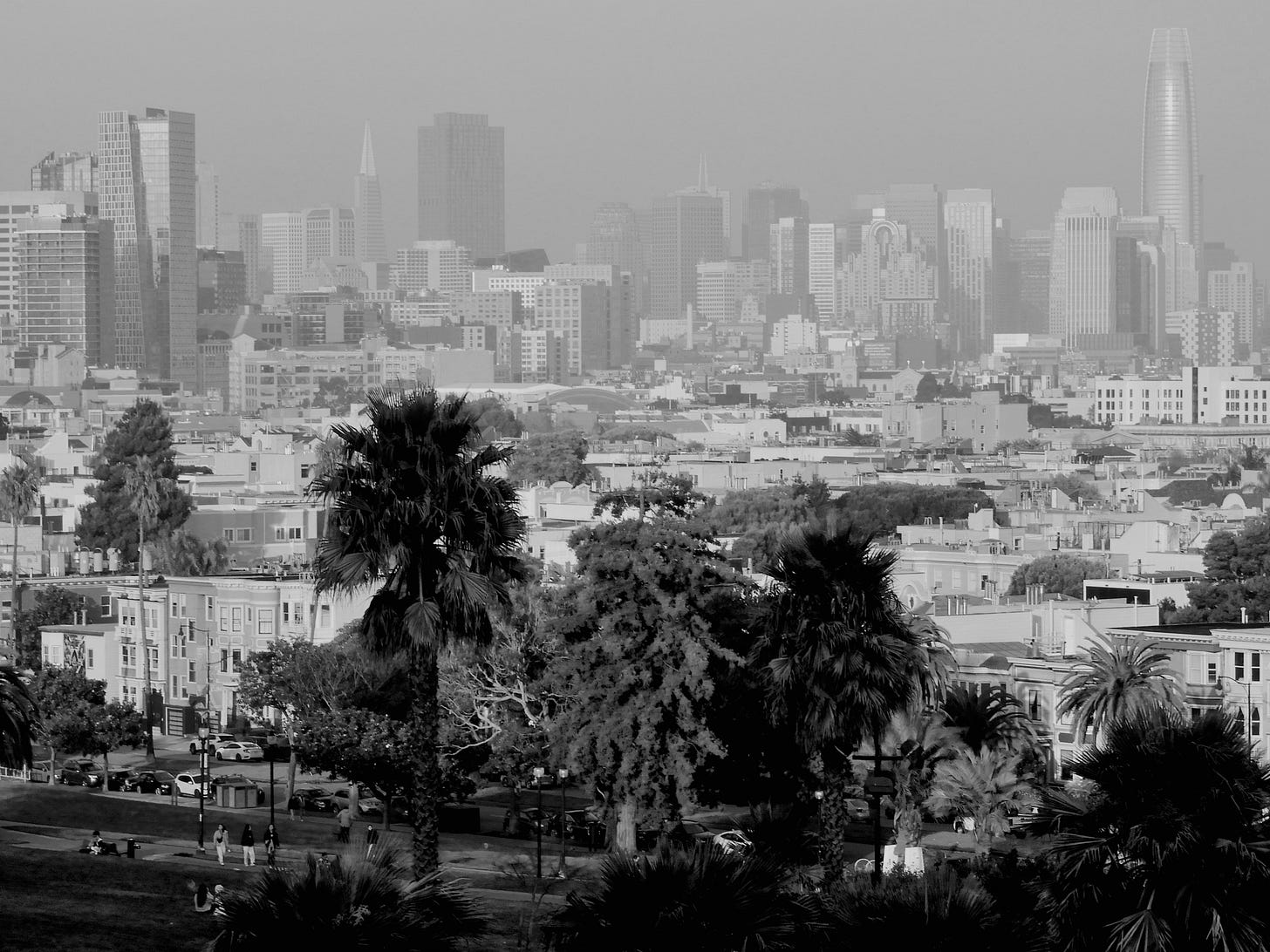The stories we tell are not true or false. We live stories and they become us as we live. The truths and the lies folded into our stories belong there. No need to push back at them, to try to get at the factual or the real. These are stories, not reports, not journalism, even when journalism becomes a genre of storytelling as it has. My own story has difficulty remembering itself. It goes on without me and I tell it in the same way I might tell a dream. Much of the story is lost, and much of the story is pieced together in an unconscious that refuses to abide by the fictional aspect of what is alleged to be factual. The entire legal system is based on the premise that the factual refuses availability to us, it pushes back at us with meaning and purpose that supersedes facts and must produce its own timelines and plot variances to get at truth. It is the basis of the accepted system of witnesses and evidence, of what was once called habeas corpus, and even after some coherent version of truth emerges and is written and accepted as fact, so many of the specifics and the way they play out over the mysterious unfolding of time remain beyond any truly linear understanding. It becomes obvious that what we accept as truth, in a courtroom or in our reminiscences and autobiographical understandings, how we perceive ourselves and our histories, are more accurately understood as fictions… even if they are fictions that carry the weight of great meaning and perception… even a kind of truth but only a kind of truth. I begin this story in this odd manner largely because it seems important at the outset to deny any attempt on my part to tell a true story. So much of how we understand or tell any story lies in a permanent state of transition. Ungraspable. Like seeing electrons in their vast throbbing spherical shell only because of where we look for them. What we wish to see always arrives at the pinpoint of our vision at the exact moment we direct our gaze there… and there… and there. So much changed in our small city after the last war. People no longer track such changes, and those changes evolve in imperceptive ways to most who are living inside those changes and activating them. Activating them through unconscious participation. In our town, those who claimed awareness of the nature and tenor of the changes at first were tolerated. But there was a terrifying aspect to the degree and overall outcome of the kinds of changes that evolved once the war was declared finished and the soldiers, the ones who survived, slowly integrated back into the day-to-day life of the town. Not all found an easy way back into the life of the town. The desperately wounded, the blind, the shell-shocked, like those who were aware of the changes that were taking place, were tolerated at first. But gradually if not slowly they were cast out of active collective consciousness in a bizarre kind of ignorance. The fact that the war was, for all intents and purposes, lost, made the integration of those who were most hurt by it quite difficult. But we were past the point of winning or losing wars. If we were interested in trying to gather evidence and witnesses that might shed some light of truth on the outcomes of these constantly repeating and more frequent explosive bursts of murderous inhumanity and utter self-destruction, we would have to admit that the aim of wars was no longer winning or losing. Something else was at work here, but to identify that something and to explicate it in any factual or truthful philosophical way ran the risk of delivering anyone who attempted such an understanding into the outlier status of those who were aware of the kinds of bizarre changes that had seized the life blood of the manner in which the town proceeded to go about its business. In essence they were relegated to the same subculture of those whose very presence, whose ills, and wounds and visible suffering, were evidence of a history that was largely if less than consciously denied, avoided, turned away from. But the word “subculture” is not true, is not accurate, is it? It was as if they were no longer there, they no longer could claim existence on the same level as the rest of the occupants of the town who had no experience of the full spectrum of the truths or successfully avoided acknowledging them. A devastating shunning that was also not acknowledged.
Once again, the manner in which we create stories, create them and relate them to others, comes into play here. It seems important to remember (and even this remembering fails to hold its own position in the constant movement of time and memory) that for many epochs any stories created and distributed among the people were created exclusively for the benefit of those who had the ability to read and understand written language. Stories circulated though the remaining portion of the population, among those who had no facility for reading the language or preserving it and passing it along in written form, were considered unstable and unworthy of attention by the class of people who had enough time, resources, and stability to own tablets, scrolls, and then books. Folk tales. They were denied legitimacy and lost their place in the collective fount of what was known. That we inherited this increasing propensity to only attend to stories told and distributed by the privileged portion of the population unfamiliar with the struggles of those who did not possess the access, leisure, and time it required to read has much to do with the process that disenfranchised those who wore the most devastating outcomes of war visibly as well as those who were unable to deny their insights into the changes that came to pass after the most recent war. Or, should I say, the most recent wars. It is hard to know whether the kinds of changes and the increasing segregation in our town that took place after the war/s were commonplace in other localities, other cities, other countries. It is quite possible that these changes became so commonplace everywhere they remained largely unquestioned. Normalized. Normalized as the consequence of belonging to the class of people who suffered so the privileged class could profit guiltlessly from that suffering and maintain their privilege. Perhaps there were places where those who showed signs of participating in war or questioned the wars’ outcomes and the impact of those outcomes were treated even more cruelly, were segregated more inhumanely from the mainstream (or what was being called the mainstream… remember, these stories continued to be written and distributed by those who had the resources and access to processes that allowed them to avoid any negative impact of the wars. In fact, as the victor-less wars continued it began to be whispered in some quarters that the wars provided privilege for that class). Is it dangerous for me to describe these outcomes and the people who remained unconscious of the cruelty that arose due to the outcomes and due to the normalization of wars that were neither fought to win or lose? But only engaged in out of some kind of purposefully unexamined habit and a kind of perceived and increasing benefit the materials and functions of war produced for those who controlled the stories told? The truths and untruths perceived and accepted? I don’t know. Our own city has yet to be targeted as a war zone. Many people accept this gladly, of course, even when young men and women are routinely required to take an active part in the conduct of the distant wars. Many do not survive. They are lauded as heroes while others who survive but lose limbs or mental faculties are first relegated to the realm of the tolerated and are passively and increasingly encouraged to remain silent about their experience of the wars. If they can speak at all. If they can speak at all.
This is a difficult story to tell. Again: I have lived much of my life outside of a process of recognizable truth in the public sphere and in the stories that circulate in that public. Truth is dangerous and so it is constantly circumvented and formally denied by those who would not profit if that truth were to become widely accepted. Perhaps you understand that already. It is unclear, as it might be in any story, to pinpoint the exact time the story of our town and the story of the changes that consumed our town became so difficult to understand and even more difficult to construct in any way that possessed what was once referred to as the ring of truth. At least that is the rare story of the nature of truth whispered in the shadows. Apparently truth once had a certain ring, like a bell. At least that is what I am told. In a culture where any story made available and distributed widely is largely done so in service to those who benefit most from the story, it becomes necessary to walk through the haze of untruths every day, all day every day, until it only becomes important to provide oneself and one’s loved ones with the necessities of life as best as one can. Any concept or understanding of the passage of time, the role and the evolution of the role of war and the needs of those to whom war is a kind of livelihood (and the story that is most often told is that war is a necessity and a requirement, that instigating loss in war is the foundation of profit, and death in war is heroic or a function of the necessary cleansing of society of the unwanted and dangerous) is completely muddled by the nature and prevalence of those persistently circulated untruths. The danger of questioning those untruths is largely due to the repelling force of the miasma of the sheer number of alternative stories that one must confront and attempt to sort through to get at one true story. As if that is possible. The one true story that may not even exist. This process has been known to drive those who deliver themselves into it insane. Or perhaps it is not insanity. Perhaps we are merely convinced it is insanity by the predominating stories. You see how this becomes an intellectual and philosophical whirlpool. A brain breaking unrelenting set of increasingly powerful double binds… one double bind only leads into another and another… until one cannot even be aware of how far down the whirlpool one has spun. This is no philosophical treatise. This is not a socio-political screed aimed at opening a portal through the barriers of the interlocking versions of the truth purposefully erected to keep us hopeless and disinvested from change. This is a story of my family. I apologize for the diversions of my path to the specifics. But it is a difficult story. Because, as the wars evolved into a function of economic necessity (did I actually write that? How could it be? How could I be so sure? But I shall not stop… not now) the predominating power structures based in denial of that devastating truth became more and more opaque and difficult to see though and into. Who was responsible? How could there be a benefit for the war? How could wars become the very foundation of the systems of resource distribution, as un balanced and unequal as they became? And what were the real numbers? The wounded and shell shocked came back into the city. The heroic dead were lauded. Streets were named for them. Streets and bridges. But the numbers were hidden or entirely too convoluted to make any sense. It became less important to do the necessary work to count those who were sacrificed. And the places determined to be dangerous in a kind of viral, and an increasingly random way (or so it appeared), were demolished. In one way or another. And many were transformed into and promoted as vacation paradises for those who managed, created and controlled the distribution of the entire range of stories that predominated. Some became essential resource extraction sites. And if there was resistance to any of this, then another war was almost joyfully necessitated. Another war was matter-of-factly declared to be necessary. Our screens were flooded with videos of the very entertaining and awesome fireworks displays of the opening act of bombings that ushered in the new war. Often enough, countries and later multinational corporations with equal access to weapons of war would enter into the war against whichever country or company initiated that war. In the past it was said that much depended on who won and who lost these brutal exchanges. Often enough, neither of the countries and/or companies that engaged in such devastating destruction and sacrifice were subject to any similar destruction themselves. Of course, the stories of the day as these wars went on were inundated with various levels of truth and untruth about the reasons and rationales and actions in these wars, but soon enough, it all became a matter of economics. The strategic outcome of any war became less concerned about who won and who lost. The conduct, expense and trade involved in the warmaking became the primary focus. Oh no. I may have said this before. How truthful could that be?
My candlelight is dimming and no one must know what I am writing here. I cannot afford to be shunned and disappeared. And I am trying to get to the real story. The story of my family and loved ones. I can’t believe we are the only ones affected in this way. But what way is that? How can I know? What is the truth? Can my own story, the one I am trying to spell out here, be any more or less truthful than any other? What I do know: My sister’s boy was taken. He came back from the war having lost a leg and filled with constant terror. We took him in. His nightmares were constant. We believed our home was surveilled, but then, all homes in our class were surveilled. For our own safety. For the safety of our homes. Or were they? Once he was gone it was hard to know what happened. My sister is completely stunned and her husband left soon afterward. He said he was determined to find his boy. We haven’t heard from him. Or we have been prevented from hearing from him. This is the difficulty of being convinced that everything is true and everything is false. At the same time. All I know is I held that boy in the night. He’d scratched his arms bloody. He’d wake up shouting. We were all destroyed. As if the war had in fact come home, despite the stories of the heroics of the war being predominant and inescapable and, in the streets and shops in the town, everything went on as if none of this mattered, as if none of this was real. Perhaps none of it did. Matter. Perhaps none of it was true. Sanity is evasive when the world splits in this way. When the suffering of a family member is absent from the awareness of anyone outside the house. I am determined to write this truth. It is barely graspable. Now that my nephew is gone and his father has disappeared, I must hold on to it. I do this for myself alone. I cannot risk putting others at risk. I feel my soul cracking. There is no reality in reality. My sister rocks and rocks. When they come to the door we must pretend. We speak of preserving our masked faces. To take them out when they are absolutely required. We can hear the buzz of the drones. Or perhaps it is not the drones we hear. Still, I wonder what he saw. What he did. The videos and photos of the war, of the cities and countryside where it was waged, are being made to look like what they used to call Urban Renewal. Revitalization. Fountains. Modern highways and lovely hotels with balconies that face the sea. Animal parks where they house the last of the last. The most famous of the economy’s story makers and representatives cutting ribbons for new governmental bunkers and legislative auditoriums. I can still hear my nephew waking and beating his arms against the walls. And even that fades with the sunrise. When I prepare the day’s mask. Stories can’t end. Not really. This story will not end. I have tried to understand how to end a story, how to end this story, but ending evades me. It reaches out from my gut and defies my effort to enclose it in its beginning and then its end. I know, my story is poorly told. I have no practice. No affirmation. We are not accustomed to stories that try to tell truth, particularly when the truth has been denied for so long or may not even be. Still, the remaining members of my family and the people I have loved find ways to exist in their own stories… beyond the here and now, further back than yesterday, more a breath of what used to be called truth than whatever portion of truth is available to us now. We cannot escape. Conundrum. Double bind. Brain break.
We develop alternative realities to save ourselves and then cannot be sure the alternative is not the true reality. How can it be tested? We sit in the dark and remember those who are disappeared. We repeat what we knew of them, as if this was and is the only story worthy of being told and remembered. And as for the wars? As for the global capital of war and its pre-eminence in the nature of the distribution of goods and resources and the nature of population management and expenditure? What can we do? Our lives are small and insignificant. We have been transformed into resources and profit centers. So far, in this little town, we have been allowed to remain. We have been allowed to exist and to represent to the official story tellers all that is possible for those whose lives are traded for labor and riches. All those lies and all those truths. I do not understand. Understanding has been withheld from all of us. Even those few who manage and conduct the stories of our lives and our futures have erased the truth and the possibility of truth from the discourse of the day. I do not remember the stories they tell about me. I am compelled to try to explain this for reasons that are more dreamlike, more vision than reality. More delusion than anything solid any of us can rely upon. Still, there is some voice that prods me on. I cannot tell anyone. Even my family and loved ones, even those who witness the daily heartbreak of the mythical enclosures where those like my nephew, the unfortunate ones who make war the basic unit of the economic construct, are kept so no one beyond their little yard can hear their cries. But I can hear them. In my sleep. And I can speak. For now. No one knows how long this will be allowed. Disappearances are the most expensive and most profitable businesses of the day. I will roll this epistle like a scroll. Some night, when I can convince myself I cannot be seen, when I have evaded the surveillances of the wealthy scions of our order and our story-less stories, I will take this poorly written story, true or not true or both, and I will chisel a narrow passage into the plaster and slip the straw-like scroll into the wall. What makes me believe in such a future? A future where my story will be comprehended and shared and taken as evidence of the emptiness of now? I cannot conceive of the nature of disappearances. Of my disappearance, however it occurs. They happen all around us. They are lauded and celebrated. How many times must I repeat this? Does that make this a poor story or a truthful one? My nephew is waking. I cannot go to him. Something so deep in me denies me this outcome. I am sure I am insane. But I will tell no one except the possibility of future… and even a kinder one.










Wow… no words…